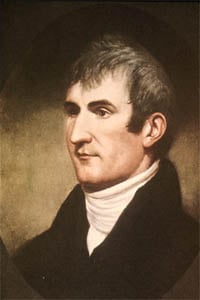*Image Credit: Wikimedia Commons Few people encapsulate the wonder of the early 19th century in the United States like Meriwether Lewis, half of the famous duo that explored the vast territory of the Louisiana Purchase. Born on August 18, 1774, he joined William Clark in 1803 to explore a large portion of what would become northern and western America. To this day, his journals from the Corps of Discovery – the official name for what is popularly referred to as the Lewis and Clark Expedition – are striking examples of the flora and fauna encountered in the wild of Louisiana Territory before settlement. The modern community of Ivy claims Lewis as a native son, where his father Lt. William Lewis and mother Lucy Meriwether lived at the time of his birth on August 18, 1774. His father died of pneumonia when he was just five and soon after his mother remarried and the family moved to the more open territory of Georgia. Here, traipsing through the woods with his rifle in hand, he gained an appreciation for the art of hunting and beauty of the outdoors. With the help of his mother and stepfather, he grew to understand the medicinal qualities of some plants and the skills necessary for tracking an animal before returning to Virginia for formal education in 1787. Six years later, 1793, he graduated from what is now Washington and Lee University, then joined the Virginia militia. In the spring of 1794, he saw his first action, working as part of a unit sent into Pennsylvania to quell the Whiskey Rebellion. Drawn to the discipline of the military, Lewis received a commission as a Lieutenant in the US Army in 1795 serving until April 1801, when the newly-installed third President of the United States, Thomas Jefferson, asked Lewis to join him in Washington, DC. Advising Jefferson on issues regarding the blend of politics and the military, Lewis lived in the presidential mansion and became known in government circles. After two years in the White House, Lewis took on the appointment for which he would come to fame: chief officer of the Corps of Discovery for the Louisiana Purchase. Jefferson, hoping to find a usable water route across the plains to facilitate trade with Asia, allowed Lewis to choose his own crew for the two-year mission. Lewis turned to a former commanding officer from the Army, William Clark, and the two set out to determine if there were any such waterways and declare US control over Native American tribes along the way. Reaching present-day Oregon in November 1805 from their base in St. Louis, Missouri, Lewis and Clark had proven overland travel was possible despite the size of the continent. Returning the following year, the pair turned over a tremendous amount of information about the plants and wildlife, as well as the natives themselves. In some corners, the idea of Manifest Destiny – that the US would stretch from sea to shining sea – gained ground as a very real possibility. Declared governor of the Louisiana Territory by Jefferson in 1807, Lewis sought to create infrastructure and bolster the fur trade, using his influence to slow the movement of white settlers into lands populated by native tribes. Though often regarded as an ineffective administrator due to a combination of his drinking habits and disagreements with local leaders, Lewis found himself under scrutiny more for his lack of communication with Washington. Seeking to recover expenses from the War Department for his purchases as governor, Lewis decided to return to the capital and left St. Louis on September 3, 1809. A month later, he stopped at an inn in Lewis County, Tennessee to rest for the evening. At dinner, witnesses reported his behavior changing, such that he talked only to himself before retiring to his room. Hours later, gunshots were heard. The following morning, Lewis’ servants found him bloodied with part of his skull missing. He would pass away later on October 11, 1809, likely after attempting to commit suicide.
August 18, 1774 CE – Meriwether Lewis is Born in Virginia Colony

